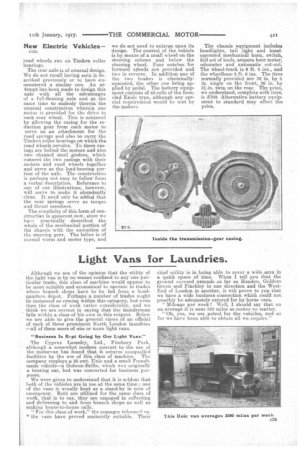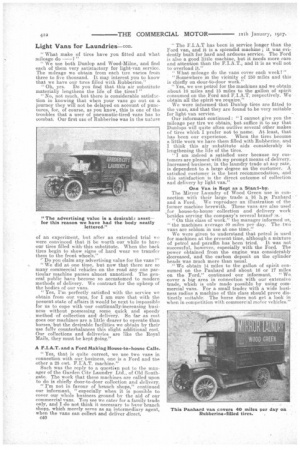Light Vans for Laundries.
Page 11

Page 12

If you've noticed an error in this article please click here to report it so we can fix it.
Although we are of the opinion that the utility of the light van is by no means confined to any one particular trade, this class of machinewould appear to be most suitable and economical to operate in trades where branch shops have to be fed from a headquarters depot. Perhaps a number of trades might be instanced as coming within this category, but even then the class of work varies considerably, and we think we are correct in saying that the laundryman falls within a class of his own in this respect. Below we are able to give the general views of an official o,f each of three prominent North London laundries —all of them users of one or more light vans.
"Business Is Kept Going by Our Light Vans."
The Cyprus Laundry, Ltd., Finsbury Park, although a somewhat modern convert to the use of the rriotorvan has found that it secures unequalled facilities by the use of this class of machine. The company employs a 25 cwt. Tithe and a small Frenchmade vehicle—a Gobron-Brille, which wee originally a touring car, but was converted for business purposes.
We were given to understand that it is seldom that both of the vehicles are in use at the same time; one of the vans is us-ually kept as a stand-by in ease of emergency. Both are utilized for the same class of work, that is to say, they are engaged in collecting and delivering to and from branch shops as well as making house-to-house calls.
" For this class of work," the manager informH "the vans have proved eminently suitable. .Their chief utility is in being able to cover a wide area in a quick space of time. When I tell you that the ground covered extends as far as Hendon, Golders Green and Finchley in one direction and the WestEnd of London in another, it will prove to you that we have a wide business connection which could not possibly be adequately catered for by horse vans. " Mileage per week ? Well, I should say that on an average it is near 300 miles as makes no matter. " Oh, yes, we use petrol for the vehicles, and so far we have been able to obtain all we-require." "What make of tires have you fitted and what mileage do —7 " " We use both Dunlop and Wood-Milne, and find each of them very satistactory for light-van service. The mileage we obtain from each tire varies from three to five thousand. It may interest you to know that we have our tires filled with Rubberine."
"Oh, yes. Do you find that this air substitute materially lengthens the life of the tires'? " "No, not much, but there is considerable satisfaction in knowing that when your vans go out on a journey they will not be delayed on account of punctures, for, of course, as you know, this is one of the troubles that a user of pneumatic-tired vans has to combat.. Our first use of Rubberine was in ths nature of an. experiment, but after an extended trial we were convinced that it be worth our while to have our tires filled with this substitute. When the back tires begin to show signs of hard wear we transfer them to the front wheels."
Do you claim any advertising value for the vans ?"
"We did at one time, but now that there are so many .coramercial vehicles on the road any one particular machine passes almost unnoticed. The general public have •become so accustomed to modern methods of delivery. We contract for the upkeep of the bodies of our vans.
"Yes, I'm perfectly satisfied with the service we obtain from our vans, for I am sure that with the present state of affairs it would be next to impossible for us to cope with ,our continually-increasing business without possessing . some quick and speedy method of collection and delivery. So far as cost goes our machines are a little dearer to operate than horses, but the desirable facilities we obtain by their use fully counterbalances this slight additional cost. Our collections and deliveries are like the Royal Mails, they must be kept going."
A F.I.A.T. and a Ford Making House-to-house Calls.
"Yes, that is quite correct, we use two vans in connection with our business, one is a Ford and the other a 25 ewt. F.I.A.T. machine."
Such was the reply to a questivn put to the mana.ger of the Garden City Laundry. Ltd., of Old Southgate. The work that these machines are called upon to do is chiefly door-to-door collection and delivery.
"I'm not in favour of branch shops," continued our informant, "especially when it is possible to cover our whole business ground by the aid of our commercial vans. You see we eater for a family trade only, and I do not think it necessary to have-branch shops. which merely serve as an intermediary agent, when the vans can collect and deliver direct.
040 " The F.I.A.T has been in service longer than the Ford van, and it is a splendid machine ; it was evidently built for hard and arduous service. The 'Ford is also a good little machine, but it needs more pare and attention than the F.LA,T.; and it is as well not tee overload it."
" What mileage do the vans cover each week?" " Somewhere in the vicinity of 250 miles and this . is chiefly on door-to-door work." "Yes, we use petrol for the machines and we obtain about 18 miles and 15 miles to the gallon of spirit consumed on the Ford and F.I.A.T; respectively. We obtain all the spirit we require." We were informed that Dunlop tires are fitted to the vans, and that they are found to be very suitable for light van service. Our informant continued : "1 cannot give you the mileage pertire we obtain, but suffice it to Bay that Dunlops will quite often outlive several other makes of tires which I prefer not to name. At least, that has been our experience. When the tires become a little worn we have them filled with Rubberine. and I think this air -substitute aids considerably in lengthening the life of the tires. "I am indeed a satisfied user because my customers are pleased with my prompt means of delivery. • Increased business, in the laundry trade at any rate, is dependent to a large degree on the customer. A satisfied customer is the best recommendation, and this satisfaction is the direct outcome of collection.
and delivery by light van."
One Van is Kept as a Stan-l-by.
The Mirror Laundry of Wood Green use in con, nection with their large trade a 16 h.p7, Panhard
and a Ford.reproduce an illustration of the former machne herewith. These vans are also used , for house-to-housecollection and delivery work besides serving the company's several branch s. "On this class of work," the manager informed us, "the machines average 40 miles per day. The two vans are seldom in use at one time."
We were given to understand that petrol is used for machines at the present time, although a mixture of petrol and paraffin has been tried. It was not successful, however, especially with the Ford. The power obtained from the engine was considerably 'decreased, and the carbon deposit on the cylinder beads was much more than usual.
" We obtain 14 miles to the gallon of spirit consumed on the Panhard and about 16 or 17 miles on the Ford," continued our informant. "We cover a big area in connection with our extensive trade, which is only made possible by using commercial vans. For a small trader with a wide business radius a machine of this class should prove distinctly suitable. • The horse does not get a look in when in competition with commercial motor vehicles."






















